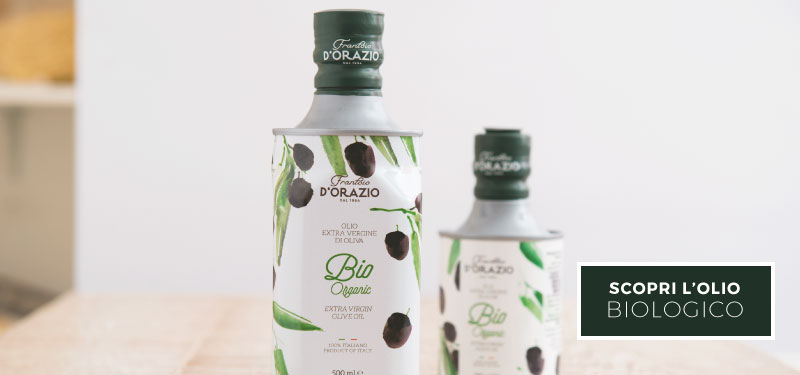To be defined as organic , olive oil takes into consideration the protection of the soil and the non-use of chemical fertilizers, herbicides or pesticides, preferring instead organic raw materials.
We cannot say that an organic oil is better than a conventional oil: they are two oils obtained by managing the olive grove in different ways.
If you were to compare organic and non-organic oils in a tasting, you wouldn't notice the difference. Furthermore, if they were analyzed without requiring the multi-residue test, which is required for organic oils, no one would notice that the conventional oil is organic.
So when is an oil organic?
An oil can be considered organic when it is produced using cultivation, harvesting, and production methods that comply with organic farming regulations.
As mentioned above, organic farming does not use pesticides or synthetic fertilizers and is part of a production ethic that respects the environment and the health of the people who work the fields and consume the oil.
Organic Apulian oil is produced in Puglia, the main extra virgin olive oil producing region in Italy, which has a long tradition of producing high-quality oil.
How organic oil is produced

Organic olive oil is produced exclusively from olives and through mechanical processes, as is usually the case with conventional oil.
As mentioned above, the only limitations for producing organic oil concern the raw materials used and the exclusion of chemical additives.
For an oil to be recognized as organic, the label must include the words: "superior category olive oil obtained directly from olives and solely by mechanical means," as required by Regulation (EU) No. 1169/2011 of the European Parliament.
How much does organic oil cost on average?
The standard cost is 9 euros per liter for two reasons:
- not much of it is produced
- The costs of the certifying body must also be covered in the price
Quality products have a cost that must be sustainable and include a number of factors: be wary of bottles of oil sold at excessively low prices.
To produce organic oil , it is also necessary to follow some specific rules for the cultivation and production of the oil.
Here are the main steps to produce organic oil:
- Soil selection: The soil must be selected based on its natural characteristics, fertility, and agronomic history. A fundamental requirement: no chemicals must have been used in the previous three years;
- Organic cultivation: olive trees must be grown using organic techniques, meaning that fertilizers, if used, must be natural, weeds must be biologically controlled, and crop rotation must be practiced to prevent the spread of diseases;
- the olive harvest must be done by hand or with the aid of manual tools, without the use of machinery that could damage the trees;
- the oil extraction must be carried out cold, using only mechanical processes and without the use of chemical solvents;
- Organic oil should be stored in stainless steel, ceramic, or dark glass containers, away from light and heat.
Furthermore, to obtain organic certification, it is necessary to comply with the standards established by the competent certification body in your country and undergo periodic inspections, as indicated above.
How to certify organic oil
To obtain organic certification, the company must contact one of the accredited control and certification bodies.
Organic certification procedures are set out in EC Regulations No. 834/2007 and No. 889/2008, which define in detail various technical aspects relating to:
- production
- labeling
- check
These technical aspects also apply to imported products.
When you buy an organic product you will notice a symbol: the leaf with twelve white stars on a green background.
This is because products labelled as organic are identified by the European logo.
Organic certification covers all levels of the production chain and can be obtained by both agri-food producers and processing companies.
From the moment the company contacts one of the control bodies, it begins a recognition or conversion process at the end of which the company obtains the organic certification .
Once you've obtained organic certification, however, you're not exempt from inspections. The certification body will continue to conduct ongoing checks to ensure the company continues to meet all organic standards.
Frantoio D'Orazio also has its own organic Apulian oil , available in two formats: 500ml and 3 litres, which has been recognised with the certificate of conformity .
In recent years, organic olive oil production in Puglia has increased, reflecting general trends: demand for organic products has grown, and so has the local culture.
Organic olive oil from Puglia is internationally recognized as a top-quality product, rich in health benefits, including a high content of antioxidants and monounsaturated fatty acids.
Frantoio D'Orazio's organic Apulian oil puts nature at the center and is produced in bottles with a unique and special design that recalls the territory of the region where it is produced.
